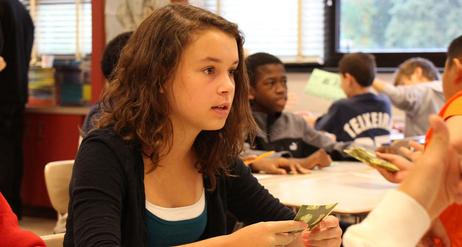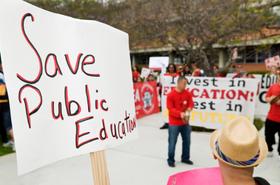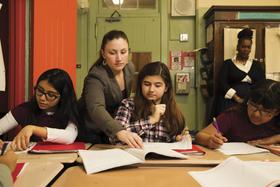Standardized tests have come under fire once again in Washington D.C., as the results in three schools have now been thrown out due to testing procedure violations and allegations of impropriety. The city has also implemented tighter security guidelines and is monitoring more schools for testing irregularities each year, according to a report at WAMU. The results of this investigation have resulted in specific measures being taken to ensure the integrity of the testing process in the future. However, questions still remain about how Washington D.C. schools ended up in this position in the first place and whether high-stakes testing is to blame for the problems.
This video reports on the C.D. schools' standardized test scandal.
A History of Washington D.C. Test Issues
Michelle Rhee, the former chancellor of Washington D.C. schools, sang the praises of many of the schools that raised their standardized test scores by astronomical numbers under her watch. Rhee used the test results as evidence that her sometimes unpopular methods of education reform were working. One school, in particular, Noyes Education Campus, showed two-year gains that were nearly unheard of in the public education system. However, the school also displayed an unusually high number of erasures on their tests, which raised the eyebrows of some education officials and the media.
USA Today was all over the concerns and looked at other schools within the city to see if questionable results could be discovered. The publication performed an extensive investigation into test results in Washington D.C. and found that as many as 103 schools within the school district had questionable results on tests due to a higher than the average number of erasures that switched wrong answers to correct ones. As a result of the in-depth investigation and reporting by USA Today, the school district launched its own investigation into the methods of testing used by the schools.
The Investigation
In light of the findings by USA Today, acting chancellor Kaya Henderson asked the office of the D.C. Inspector General to launch a separate investigation into testing procedures. The findings of this independent investigation have now been released and were recently announced by the D.C. State Superintendent of Education, Hosanna Mahaley, and reported by the Washington Post. According to Mahaley, the problems that were found were isolated and did not affect the large majority of schools in the city. However, some of the problems that were detected were large enough to warrant the removal of test scores completely.
The classrooms in which test scores were invalidated were located at Noyes Education Campus, C.W. Harris Elementary, and Leckie Elementary. In addition to throwing out test scores, one teacher was suspended, and two others will not be allowed to participate in testing during the next school year. Officials of the district emphasize that the incidents are extremely isolated and that most of the schools in D.C. followed exam protocol to the letter when the exams were given. However, a report in the Washington Times states that the district is also investigating 14 schools for testing irregularities on another standardized test that took place this year.
This video reports on the role of Chancellor Michelle Rhee in the D.C. schools' standardized test scandal.
What the Investigation Found
Some of the testing violations that were found during the investigation included teachers who stood too close to students during the test or students allowed to use cell phones during the test. In one case, a student finished the test in half the time it took the other students. When questioned about the speed of the test, the student said that many of the questions had been familiar. In another instance, a teacher had improperly used a previous year's exam to prepare students for the current year's test. In that case, the school reported the incident and fired the teacher on their own.
Another point of the investigation was to determine the erasure rate on test results at some schools. According to test investigators, high rates of erasures on answer sheets may indicate that students were encouraged to change incorrect answers or that answers were changed after the tests were turned in. Noyes, as well as two other schools that were investigated, had erasure rates on the tests that were 10 to 12 times higher than the district average. Some of these schools are also the ones that have shown the greatest progress in student achievement, which may also have to be questioned in light of the current investigation results.
Although the three schools with invalidated test scores were listed and some of the specific concerns over exam violations were spelled out, Henderson would not provide the details of any of the classrooms with issues. She also refused to name the teachers who were implicated in the violations, citing privacy statutes that prohibited her from doing so. It is also not clear what will happen in the other classrooms where the district believes action must be taken to prevent future issues during exams.
Mahaley agreed that the incidents were isolated and should not take away from the progress that many D.C. schools have made in educating students more effectively. Mahaley told the Washington Times, "When you look at fourth-grade test scores in the District of Columbia between 2007 and 2009…the average gain for students was more than five points higher than the national average."
In Washington D.C., nearly 3,800 classrooms take the standardized exams. Despite this large number of exam administrations, the in-depth investigation only uncovered 31 irregularities, 14 of which required further measures by education officials. As acting chancellor, Henderson told the Washington Post, "Most of our teachers and students are playing by the rules." However, those who are not, due to the pressures inflicted by these standardized exams, are a glaring example of why education reform is still far from finished in this country.
Questions? Contact us on FAcebook. @publicschoolreview















